
Eupithecia is a large genus of moths of the family Geometridae. There are hundreds of described species, found in all parts of the world, and new species are discovered on a regular basis.

The lime-speck pug is a moth of the family Geometridae. It is a common species throughout the Palearctic region, the Near East and North Africa.

The common pug(Eupithecia vulgata) is a moth of the family Geometridae. It is a common species across the Palearctic region, the Near East and North Africa. It ranges from the Atlantic coast of Ireland and Portugal across Europe, the Middle East and Central Asia to the Russian Far East (Priamurje) and Korea.

The grey pug is a moth of the family Geometridae. It is found throughout the Palearctic region and the Near East. It is also found in North America.

The tawny speckled pug(Eupithecia icterata) is a moth of the family Geometridae. It is found throughout the Palearctic region, the Near East and North Africa.

The juniper pug or juniper looper(Eupithecia pusillata) is a moth of the family Geometridae. It is found throughout the Palearctic and Nearctic regions and the Near East.

Freyer's pug is a moth of the family Geometridae. The species can be found in Europe, east to the Urals, the Russian Far East, Kazakhstan and China. It is also found in North America.
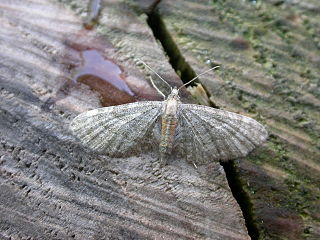
Eupithecia haworthiata, or Haworth's pug, is a moth of the family Geometridae. The species was first described by Henry Doubleday in 1856. It can be found in western, south and central Europe, Asia Minor and the Caucasus. It occurs in the Alps up to 1800 meters, in the Apennines up to 1400 metres and in the Balkan mountains up to 1500 m above sea level.

The cloaked pug is a moth of the family Geometridae. The species was first described by Johann August Ephraim Goeze in 1781 and it can be found in Europe and to the east in Siberia.
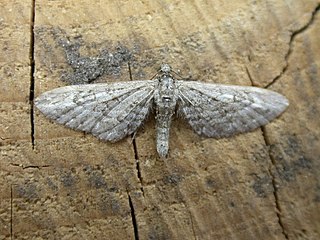
Eupithecia nanata, the narrow-winged pug, is a moth of the family Geometridae. The species can be found all over Europe including Russia and Ukraine. In the Alps it occurs up to 2,200 metres (7,200 ft) and the Pyrenees to 2400 meters above sea level.The species prefers dry or boggy heathlands.

Eupithecia venosata, the netted pug, is a moth of the family Geometridae. It was first described by Johan Christian Fabricius in 1787. It is found across the Palearctic ecozone from Portugal and Morocco in the west to the Lake Baikal in Siberia and Afghanistan and Pakistan in the east.
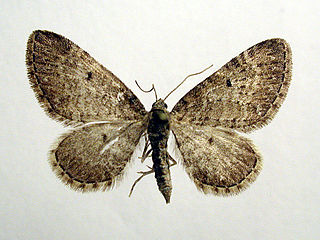
Eupithecia satyrata, the satyr pug, is a species of moth of the family Geometridae. It was described by Hübner in 1813. It is found from Ireland, through northern and central Europe East to all of Russia and Central Asia and West Siberia to Tibet. It is also present in North Africa and North America.
Ochyrotica is a genus of moths in the family Pterophoridae and only genus in the Ochyroticinae subfamily. Ochyroticawas described by Lord Walsingham in 1891 and the subfamily Ochyroticinae was described by Lutz Thilo Wasserthal in 1970.
Ochyrotica cretosa is a moth of the family Pterophoridae. It is known from New Guinea, the Moluccas and the Solomon Islands.

Eupithecia denotata, the campanula pug, is a moth of the family Geometridae. The species can be found from western Europe to central Asia and China.
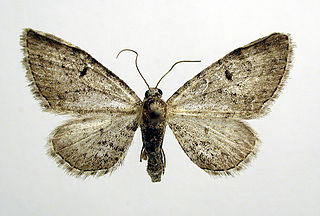
Eupithecia pimpinellata, the pimpinel pug, is a moth of the family Geometridae. It is known from most of Europe to Morocco, Siberia, Kyrgyzstan, Altai, Mongolia.
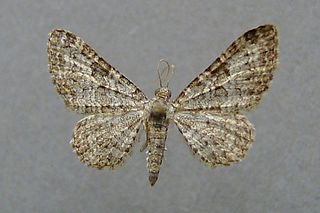
Eupithecia impurata is a moth of the family Geometridae. It is found from the mountainous areas of western, eastern and southern Europe up to Western Asia.

Eupithecia distinctaria, the thyme pug, is a moth of the family Geometridae. It is found throughout Europe. It is also found in Iran.
Eupithecia graphata is a moth in the family Geometridae. bIt was described by Treitschke in 1828. It is found in most of southern and eastern Europe, as well as the Near East.


















